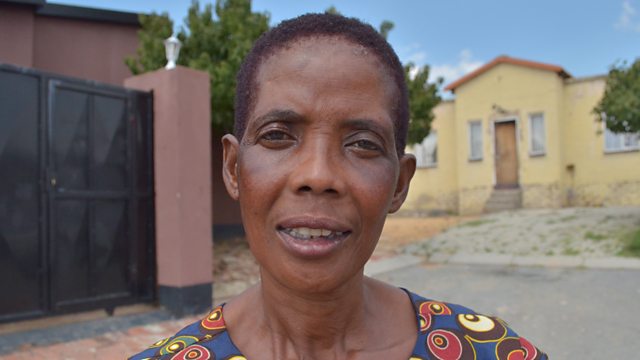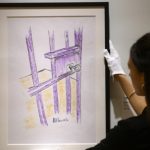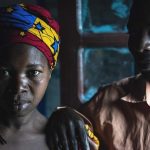I moved to Johannesburg as an adult without children in the first years of the new millennium. That quickly changed, however. I had five kids in total. But after their births, my relationships with their fathers fell apart and I found myself alone, struggling to support and raise my kids on part-time jobs.
Life was so difficult because I was a single parent of five. Since I didn’t finish my school it was hard for me to get a good job. I was just doing anything. I worked as a cleaner or gardener and even sometimes in construction. I’d do anything because I had to put food on the table for my kids.
By early 2005 my life was about to change for the better. Or at least that’s what I thought. While working as a cleaner for a family I met some pastors from Nigeria who worked for a church across the road.
One day I went to visit them. It was so nice. They welcomed me so nicely. The pastor who met me on the streets told me he would come and visit me to see where I lived. I gave him my address and when he came to my house he said he was not happy about my living conditions because I stayed in a very small house – just a one-room house. He and the church decided to get me groceries every week.
For a single mother of five children, weekly food parcels and the additional money the church offered made a huge difference.
I was so relieved when they told me they were also going to help me with the kids – buying uniforms for them, giving them food and what have you… I was so very, very excited and I felt God had started answering my prayers.
I had no reason to doubt the intentions of those pastors. I trusted them so much because they were pastors. They were not people I met in a tavern or in a night club. So I thought they were men of God and they were helping me.
Then they told me that they felt they were not doing enough for my family and they had even more good news for me. They said they were going to get me a job overseas, exporting carpets from Iran to China.
I agreed to take up the job without hesitation. The pastors organized everything for me from passport and visas to a nanny for my children. For the very first time in my life, I was ready to see the world. I was very much excited that now even I was going overseas.
I thought the job was going to help me to build a big house for my kids, so that they will have some bedrooms to themselves, better than the one bedroom we all shared and go to better schools.
In September 2005 I flew to Iran in the Middle East. Upon my arrival in Tehran, a five-star hotel had been booked for me. I was going to connect with a businessman who will show me how things would work.
At around midnight, the phone rang in my room. It was the guy. He told me he was in the hotel lobby and that I should come down. He told me to take everything I had with me and not leave anything behind in that room.
I did as I was instructed. I met a smiling man in the hotel reception. I was suddenly whisked away to a very different situation. I was taken to another lodging with other women. There was no furniture in the room.
I started to ask this guy, “What’s going on?”
He was no longer smiling.
“Ladies let me tell you something,” he said. “You were told you were coming here to export carpets. But you are here to swallow drugs. You are here to traffic drugs.”
And then he started threatening us.
“If you don’t want to listen to me, I’m gonna kill you,” he said. “I will kill you and throw your bodies in the desert.”
The guy took everything we had from us. He took our phones and our passports and we had to listen to his commands.
Then they gave us some big capsules to swallow. They were wrapped in something like brown paper. The thing was hard like a stone. Very hard. They said I must swallow one hundred of them. Each of those capsules was bigger than a lipstick. And they gave me a litre of water to help me swallow them.
There was another lady from Uganda, who like me, struggled terribly to swallow those capsules. In the end we were each able to swallow just about 40 of those capsules and we hid the rest in our clothes. Our captors then called a taxi to take us to the airport where we’d take a flight to China to deliver the drugs.
When the taxi driver came to take us to the airport, we tried to tell him that we had drugs on us but the guy didn’t understand a single word of English. He just took us to the airport and dropped us there.
At the airport as well, we attempted to inform the police. But again, language barriers got in the way. At the security points, as we were being scanned, red alerts kept showing up. We were taken aside and, of course, the Iranian official found the drugs on us.
We tried to explain. But they didn’t understand us and we didn’t understand them. What I was hearing from them was ‘heroine’ and I thought it was the name of a person because I didn’t know the names of drugs. I suddenly started feeling dizzy and there was blood coming out of my nose. Then I collapsed at the airport.
One of the capsules had burst in my stomach. I had an emergency operation to save my life.
When I woke up in hospital, I was surrounded by many doctors and police officers.
One of the officers who could speak English said to me, “In Iran if they catch you with drugs, they are killing you.”
Shortly after that I was taken to a prison facility.
Over the next year and a half, my co-accused, Mary and I went through our trials, though we found it hard to follow what was going on. We were given a translator with very little understanding of the English language. Whenever we were going to court, we would see our photos in the newspapers but we didn’t understand what they had written about us.
But one day, an article was published which seemed to be very different from everything that had been published before. There was something different because all the prisoners were coming to look at us like they were feeling sorry for us. When we asked for a translation of what had been written, most of them were reluctant to tell us – except for one prisoner who spoke English. She told me that we were going to be hanged. The South African embassy later confirmed to me that I had just 30 days to live before I would be hanged.
To me it was a relief that at least I was going to die. It was my wish that it would be better if they would hang me there and then because life was so difficult in that prison.
My children were always on my mind. I was thinking about them all the time. Sometimes I would dream about them only to wake up to find that I’m in prison. If I died, I wouldn’t dream about them again; I won’t think or worry about them and it would be better for me to die.
When I was given the death penalty I was afraid to tell my family that I was going to die. Whenever I called my sister I told her I had been sentenced to five years imprisonment.
When the 30thday came, I waited from early in the morning around 3am. I was thinking that maybe they would come and take us where we were going to be hanged. But nothing happened. The evening came and nothing happened. The following day nothing happened. Second day. Third day. Nothing. And they were not telling us anything.
Days turned into weeks and weeks into months.
It was in the months that followed that I learned that my sentence had been commuted from death to life in prison. I didn’t know why. I was still looking forward to dying. But then I had a conversation with Mary that gave me a new perspective. She told me about the Muslim custom where dead people were given a swift burial, often before sunset on the day they die.
“Are they not going to take my body home?” I asked.
She said, “No, they will bury you here, same time.”
When Mary told me that, my eyes were opened. ‘So if I get hanged here, even my kids will never know where my body is buried,’ I thought. That was when I told myself that I was going to live for my kids. I was not going to die.
Months turned into years and I remained behind bars, hopeful that I’d leave prison one day. I taught myself Farsi and diligently kept a diary to record my experiences behind bars.
I wrote down everything that happened to me in my diary. Sometimes when I thought about my children, I will cut a magazine and paste pictures of children in my diary. I also wrote some poems.
In March 2013, I was in my cell one day when I heard them calling my name. I thought they were calling me to take my medication. “Nokwazi Mamela, you are free,” they said.
Wow. I couldn’t believe that they were saying I was free to go.
In prison when you are about to be set free, the other inmates will come and dance and celebrate. They danced and came to me as well. It felt like I was dreaming but then the police came and asked, “are you still sitting? We are going. Come and let’s go.”
I was never given an explanation as to why I was so suddenly released. The South African embassy bought a plane ticket for me to go home. I still was in disbelief as the plane took off and I stood up in my seat and yelled in Farsi: “Goodbye, Iran”
The Iranians on the plane asked me why I was saying that. I told them my story. I told them about how my death sentence was commuted to life imprisonment and how I couldn’t believe that I was free, breathing, alive and heading home.
When I landed at OR Thambo International Airport in Johannesburg the first thing I did was to kneel down and kiss the ground. I was delighted that I was really back home in South Africa. Everything to me was new. It was like I was in a new world. The smartphone was a new thing to me then. I didn’t even know how to answer the phone. I didn’t know anything.

When I saw my children we all just cried. They cried and I cried with them. My problem at the time was that I had too much anger in me. I blamed myself that if I hadn’t followed those pastors, my kids wouldn’t have been left alone to suffer so much. Sometimes when they told me about the challenges they faced while I was away, that thing would be killing me inside. It made me feel I had been a useless mother to them.
But one day my daughter told me, “You know what, mama? I see that you are blaming yourself but all of us know that you went there because you were trying for us. Don’t blame yourself.”
I really appreciate my kids. Now, I’m staying with my grandchildren. They are the most precious things in my life. I love them so much.
Some of the people who forced me to smuggle drugs in Iran have since been convicted and are in prison now. Yet, I have too much anger towards them. It’s hard to forgive. I can say I forgive them but the scars that I have will never disappear.














